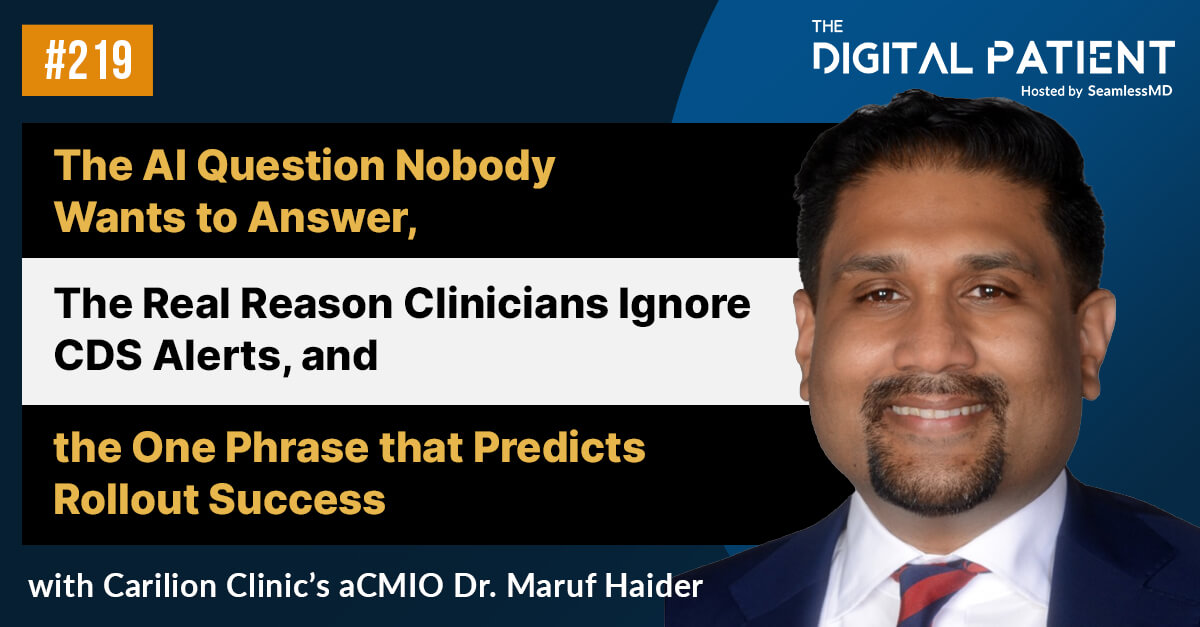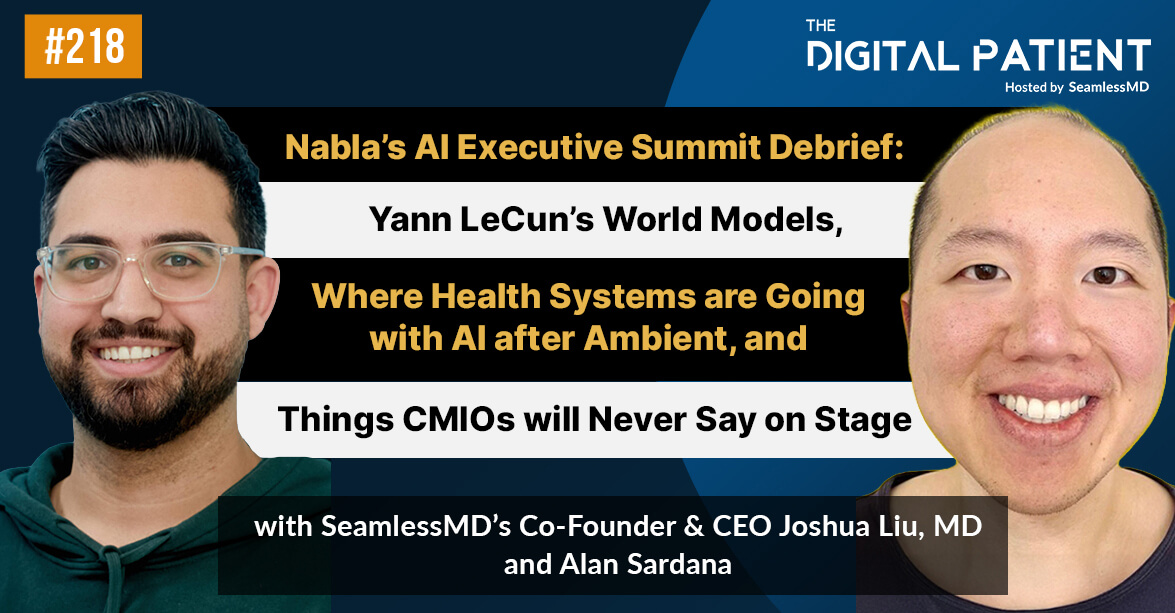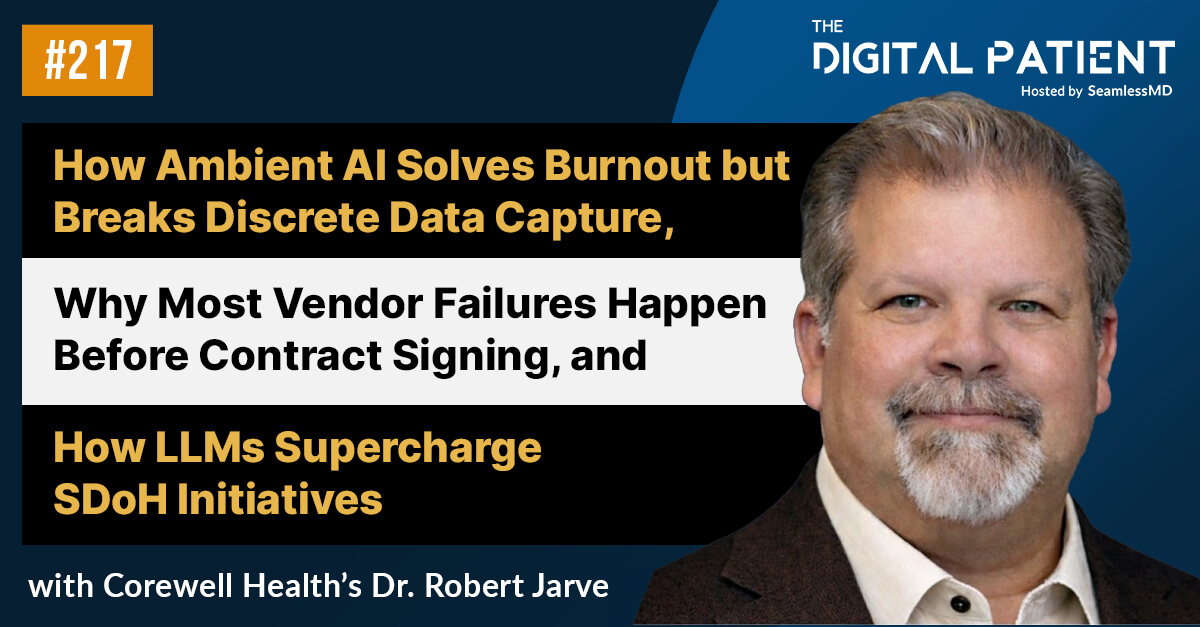Subscribe on: RSS | SPOTIFY | APPLE PODCAST | GOOGLE | BREAKER | ANCHOR
On this episode of "The Digital Patient" podcast, hosts Alan Sardana & Dr. Joshua Liu speak with Dr. Patrick A. Woodard, Chief Digital Officer at Methodist Le Bonheur Healthcare, about his journey as a "Physician Tech Entrepreneur-Turned Chief Digital Officer and What Healthcare Leaders Can Learn from Musical Orchestra". Click the play button to listen or read the show notes below.
Audio:
Video:
Guest(s):
- Dr. Patrick A. Woodard (@pwoodard), Chief Digital Officer at Methodist Le Bonheur Healthcare
- Dr. Joshua Liu (@joshuapliu), Co-founder & CEO at SeamlessMD
Episode 74- Show Notes:
[0:00] Introducing Dr. Patrick A. Woodard, Chief Digital Officer at Methodist Le Bonheur Healthcare;
[1:15] How Dr. Woodard gained an appreciation for health tech by recognizing the similarities between health policy and technology, both enabling transformation at scale, which he had experienced in a health policy course during his final year of med school;
[04:30] Why Dr. Woodard built DocDox during his residency to improve patient transitions after a patient was “lost” in the system following a transfer from cardiac to neurology when a night resident took home the paper patient list;
[08:00] Why Dr. Woodard is hopeful for the future of digital technology on the wards, yet prefers to use paper for notes today as he believes you only have a brief moment to connect with a patient and current technological hardware can make a physician appear distant as they gaze into their device;
[11:45] How being a health tech entrepreneur has changed how Dr. Woodard views vendor relationships as he’s personally dealt with roadmap challenges and long sales cycles, and why he pushes vendors to understand and integrate into current workflows, empower “internal sales teams” (hospital CIOs, CMIOs, etc.), and to create tools that are holistically useful;
[17:20] Why interoperability sounds like the opposite of defensibility for a health tech vendor, but is actually an advantage for solutions that operate well and are embedded into current workflows (as change management is incredibly difficult);
[19:06] Why Dr. Woodard believes EHRs in the future will be akin to data repositories in which users get access to information depending on their role and the specific context (e.g. 3rd party billing vs. a neurologist generating research reports) and how there are myriad challenges to overcome along the way such as configuring the correct way to parse this information so that it is useful;
[26:50] Why Dr. Woodard believes in XAI (Explainable Artificial Intelligence) where the inputs and outputs are explained instead of traditional “black box” AI unless outcomes were good 100% of the time, as AI models trained with inherent bias, can lead to unfavorable results, which was the case when an AI model was used to detect COVID-19 in radiographs but was trained with COVID-positive radiographs that had an “R” symbol denoting the right lung against COVID-negative radiographs without the symbol;
[36:50] How Dr. Woodard grew up playing violin and why he believes orchestras operate similarly to health systems where you have individual commitments (in orchestra: play well enough to not be noticeable among the 20 or so other violinists vs. in healthcare: commit to doing X amount of interoperability or have a 99.999% uptime) and collective commitments (in orchestra: play cohesively and bow in the same direction vs. in healthcare: play nice in the sandbox with interoperability, share learnings, etc.);
[41:10] How amateur orchestras typically follow a “rehearse, practice, dress rehearse, perform” cadence, whereas professional orchestras add in team reflection time to understand how to play well together, and how health systems can benefit from adopting a similar growth mindset, conducting post-mortems before moving on to the next project;
[47:05] Why Dr. Woodard is most excited about the collective of all patient-facing innovation today as opposed to individual components as there is a great opportunity to share learnings and “level up” together;
Fast 5 / Lightning Round:
- What is your favorite book or book you’ve gifted the most?
“The Lean Startup” by Eric Ries.
- In what ways did being a violinist make you a better clinician?
“The ability to connect in a non-verbal way… There is an element of performance in everything we do. Recognizing that there are a lot of non-verbal actions that make a 6 year old on stage look like an amateur vs. a prodigy. As a clinician, how you say something is often more important than what you’re saying. For example, giving good news nervously is going to make the patient feel uncomfortable.”
- Would you rather have Super strength, super speed, or the ability to read people’s minds?
"Mind-reading."
- What is something in healthcare you believe that others might find insane?
“Paying more people to solve the problem than just solving the problem.”
- COVID-19 lockdown related – what is 1 hobby or activity you’ve gotten into since the pandemic?
“I cook a lot and I like to level-up my skills. Pre-pandemic, I would travel often and learn about new foods and techniques to bring home. So, cooking!”
.svg)










.png)
